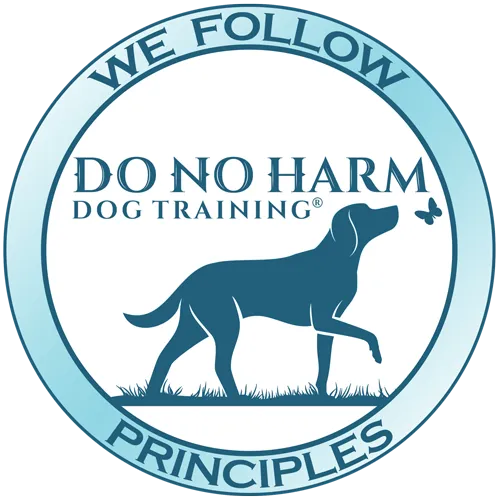About DogFluent
What Exactly Is "Positive Training"?
Positive Training Is...
As a Victoria Stilwell Academy Certified (VSA) Dog Trainer, I abide by Victoria's Four Pillars of Positive Training.

These four elements comprise the VSA concept of positive training. In conjunction, these pillars are powerful and effective in building long-term relationships with your dog based on mutual trust and respect.
Use Positive Reinforcement: The basic premise of positive reinforcement means that if you reward a behavior you like, there is a better chance of that behavior being repeated.
Avoid the Use of Intimidation, Physical Punishment or Fear: Behavioral science has shown that using punitive training methods does not work long term. In fact, punishment-based training has fall out. It can actually increase aggression. Additionally, the American Veterinary Society of Animal Behavior (AVSAB), recommends that "only reward-based training methods are used for all dog training, including the treatment of behavior problems."
Understand the Misconceptions of Dominance Theory: The concept of dominance, and how it occurs in the dog world, is one of the biggest ongoing misunderstandings about canine behavior. Phrases like "pack leader," and the concept of "alpha," are common misconceptions, and widely misrepresented in modern culture. A common myth is that a dog's misbehavior is the result of the animal trying to assert their dominance over humans. To learn more, check out Victoria Stilwell's essay, The Truth About Dominance.
Learn About the Canine Experience from the Dog's Point of View: To form a solid bond with your dog, it's crucial to truly grasp how he perceives the world. To achieve this, you first need to learn their "language" and appreciate their vibrant sensory experiences. Senses are linked to emotions, and emotions drive behavior, therefore, you can use their senses to help your dog learn. Doing so will help you build a stronger relationship and make it easier to find positive solutions to any issues your dog might be experiencing.
The bottom line is that it's much safer, more effective, and humane to reward the behavior we want repeated, and to ignore or redirect a behavior you do not want repeated. Our dogs are not trying to dominate us, and they do not need to be punished to understand the basics of positive training.

Amy Ellis
Owner/trainer,VSA-CDT
My lifelong passion for dogs has led me to work with them in a variety of roles - as a dog sitter/dog walker, an animal tech at my local SPCA, as well as a dog trainer.
I am dedicated to using only positive-reinforcement and force-free training. My approach considers our dogs' perspective in this human-focused world. I feel that learning should be enjoyable for both dogs and humans throughout the process. I firmly believe animals of every stripe deserve to be treated with respect, kindness, and compassion.
I will challenge you to think differently -- to see your dog as a true companion, not merely just a pet. I want to help you understand that dogs have needs and wants just like us, and I will guide you in determining what they are and how to meet them. I will encourage you to view the world from your dog's perspective, and I will teach you how and why you should give your dog opportunities to make choices in his daily life.
When I'm not teaching dogs or their people, I enjoy hiking with my husband and my own dog, Tink. I enjoy spending time recording nature videos and photography, gardening, stand-up paddle boarding, yoga, and traveling.
"Our nine year old dog was a sweet but overly exuberant boy, jumping on us when we were trying to feed him and jumping on everyone who visited. After Amy worked with him he not only stopped jumping, but Amy taught us to communicate clearly with him so he knows what we want. With better communication comes a better relationship. He wants to please but we didn’t know how to ask. We cannot recommend Amy enough. We are better pet owners and we have a well behaved dog."
CHRIS, CHRISTI + PAPPY (FREDERICKSBURG)
Serving the greater Fredericksburg area:
Including any location within a 20 mile radius of Fredericksburg.


Professional, ethical training services in Fredericksburg, Spotsylvania, Stafford, and surrounding counties within a 20 mile radius of downtown Fredericksburg, VA.
Contact Info
540-456-9733
I do my best to answer email within 36 hours and return phone calls within 72 hours. Email is usually the fastest way to reach me.
Business Hours
Sunday to Monday - Closed
Tuesday - 8am to 7pm
Wednesday - 8am to 4pm
Thursday - 7am to 11am
Friday - 8am to 7pm
Saturday - 7am to 3pm
2025 DogFluent Training | All Rights Reserved









